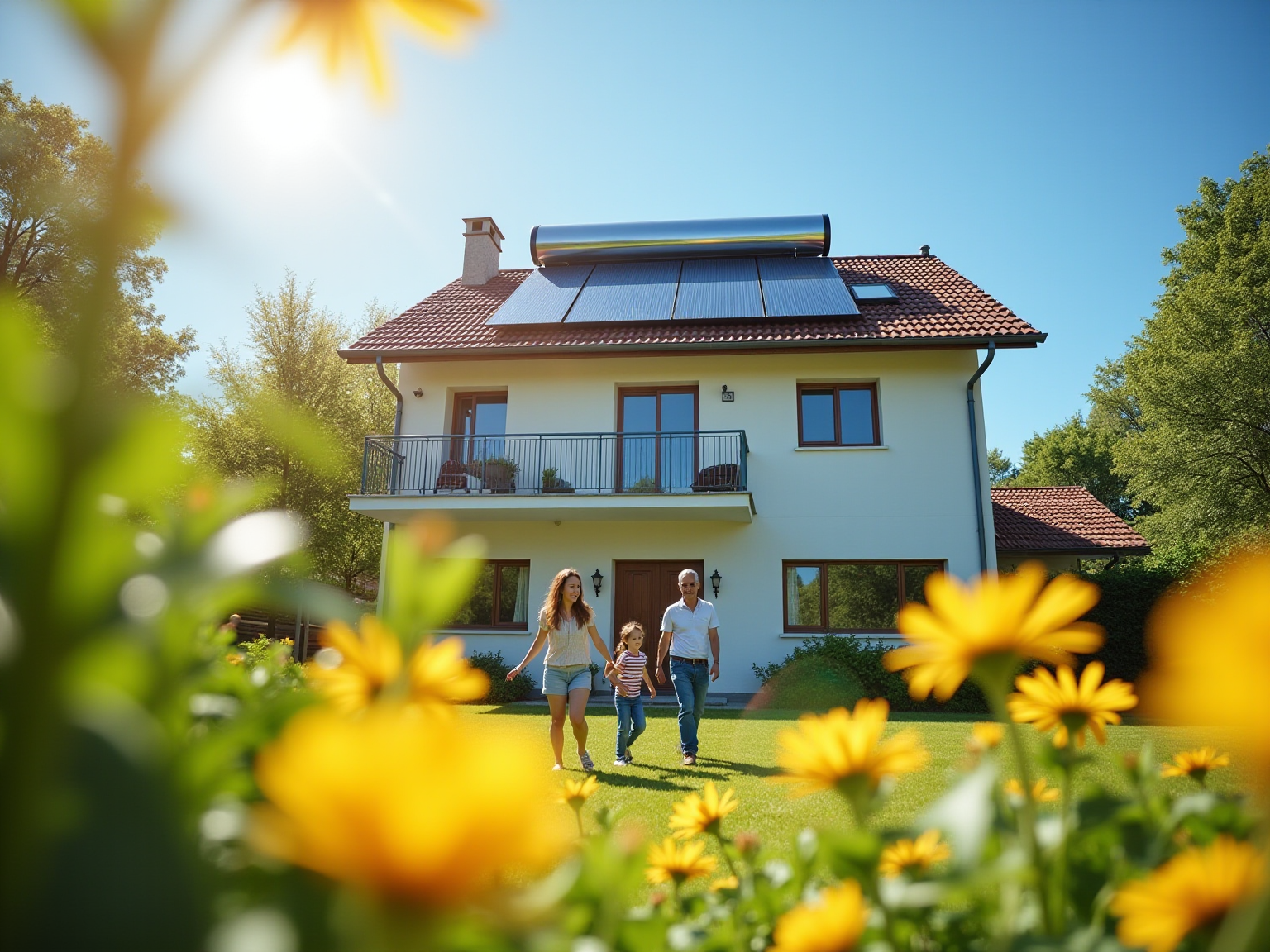Overview
In 2025, many homeowners are understandably concerned about rising energy bills. The good news is that solar water heaters can offer significant relief, with potential savings of 50% to 80% on monthly energy costs. Imagine the peace of mind that comes from knowing you’re making a smart financial choice while also contributing positively to the environment.
These systems do more than just lower utility costs; they enhance your home’s marketability and promote environmental sustainability. By investing in solar water heaters, you’re not only taking a step towards energy independence but also helping to reduce greenhouse gas emissions. It’s common to feel overwhelmed by the options available, but rest assured, this choice can be a wise investment for your future.
Together, we can explore how solar energy can transform your home into a more energy-efficient haven. Let’s work towards a brighter, more sustainable future—one where your energy habits reflect your values. If you’re ready to learn more about how solar water heaters can benefit you and your family, don’t hesitate to reach out. We’re here to support you every step of the way.
Introduction
As energy costs continue to rise and environmental concerns grow more pressing, we understand that homeowners are increasingly seeking innovative solutions to alleviate their monthly expenses and reduce their carbon footprints. Solar water heaters stand out as a powerful option, harnessing the sun’s energy to provide significant savings on water heating bills—potentially cutting costs by 50% to 80%. This transition not only offers immediate financial benefits but also aligns with a broader commitment to sustainability.
With advancements in technology and supportive government incentives, the case for solar water heating has never been stronger. Together, we can explore the numerous advantages of these systems, which can:
- Enhance your home’s value
- Ensure energy independence
- Contribute to a cleaner environment
This makes solar water heaters an appealing choice for modern households, and we are here to support you every step of the way.
Reduce Monthly Energy Bills with Solar Water Heaters
Are you feeling overwhelmed by rising energy bills? for homes present a wonderful opportunity to harness the sun’s power, significantly lowering your monthly utility costs. Homeowners just like you can enjoy savings between 50% and 80% on heating expenses, which can translate to hundreds of dollars saved each year. This remarkable reduction is especially advantageous in areas where utility costs are high, making solar water heaters a wise investment for many families.
For instance, did you know that a family of three typically requires around 12.03 kWh/day for heating? By making the switch to solar water heaters, you can drastically cut down on energy consumption, leading to substantial savings over time. Although the initial investment for these systems usually ranges from $2,000 to $5,000—depending on factors such as size and installation costs—the long-term savings often allow families to recoup this upfront expense within just a few years.
We understand that choosing the right system can be daunting. Experts like Andrew Giermak emphasize that ‘ are more prevalent than passive heating systems because they offer more reliable and manageable heated liquid.’ This insight underscores the advantages of opting for active systems, which can enhance both savings and efficiency. Active setups utilize pumps and controls to circulate heat transfer fluids, making them particularly suitable for homes that require consistent heating, especially in cooler climates.
As more homeowners recognize the benefits of renewable energy, the demand for these heating devices continues to rise. Many families are now embracing the advantages of solar water heaters, not only for energy independence but also for their ability to reduce overall utility costs. The economic and environmental benefits of renewable heating systems—including job creation and a decrease in greenhouse gas emissions—further affirm their value.
With Powercore Electric’s commitment to quality installations and maintenance, you can trust that your transition to renewable heating will be smooth and efficient. Together, we can ensure you maximize the benefits of your investment, leading to a more sustainable and cost-effective future.
Lower Your Carbon Footprint by Using Renewable Energy
We understand that energy bills can be a significant concern for homeowners. Transitioning to renewable heating systems offers a wonderful opportunity to lessen your carbon footprint by utilizing sustainable resources. This shift not only reduces reliance on fossil fuels but also leads to a meaningful decrease in . Studies reveal that solar heating systems can cut CO2 emissions by thousands of pounds each year, making them a truly eco-friendly choice for heating your home.
Numerous case studies showcase the effectiveness of sunlight-powered heaters across various residential settings. For instance, a home in Southern California experienced an astonishing reduction in their utility costs—over 70%—after installing a water heating apparatus along with a heat exchanger. This setup not only provided significant savings but also aligned with their sustainability efforts by reducing their carbon footprint.
In cooler regions, passive power collection designs have also proven effective. One notable example features a residence that utilized large south-facing windows to capture and retain sunlight during winter months, significantly lowering utility costs. The swift expansion of solar power in the United States, with an impressive 25% annual increase and exceeding 200 gigawatts of capacity, highlights the efficiency of such frameworks in promoting clean electricity.
This trend reflects a broader commitment to sustainable power practices, further supported by federal policies like the Solar Investment Tax Credit, which enhance the affordability of photovoltaic installations. Additionally, the annual maintenance cost for heating systems that harness sunlight is approximately 1%, making them a financially viable choice for homeowners.
As the Solar Energy Industries Association aptly states, ‘Let’s continue embracing this sun’s gift.’ By implementing solar water heaters that capture sunlight, you not only contribute to a healthier environment but also adopt a sustainable lifestyle that resonates with the growing demand for clean power solutions. Moreover, societies throughout history have recognized the importance of the Sun, influencing terms such as solar-related and heliosphere, which underscores the enduring significance of sunlight in our lives. Together, we can embrace these sustainable solutions and work towards a brighter, cleaner future.
Enjoy Long-Term Savings and High Return on Investment
Are you feeling the pinch of rising energy bills? Investing in for your home can lead to significant long-term savings, providing a comforting solution to your concerns. With a typical lifespan surpassing 20 years, these systems often recover their initial expenses within just 4 to 8 years through savings on power. Homeowners can look forward to a robust return on investment, with internal rates of return ranging from 13.44% to 17% over a 20-year period. As energy costs continue to rise, the financial advantages become increasingly evident, potentially saving you thousands of dollars on utility expenses throughout the life of your installation.
Understanding local climatic conditions can further enhance the performance of your heating systems, boosting their efficiency in supplying hot water for your household needs. However, it’s common to feel a bit overwhelmed by the challenges that come with new technology. As Edie notes, ‘Solar water heaters for homes are an excellent means to reduce your overall electricity expenses, but they come with challenges.’ By integrating solar heaters with heat exchangers, you can maximize your energy savings and reduce reliance on traditional energy sources.
Moreover, consider the ecological benefits: the overall CO2 emissions prevented during the operation of these systems is roughly 13.25 tonnes. A case study titled ‘Long-term Benefits of Solar Water Heaters for Homes’ reveals that implementing solar water heaters is projected to be cost-effective, with payback periods of 6–8 years and increased returns on investment as fossil fuel prices rise. The typical expense of solar heaters varies from $3,000 to $7,000, depending on the type and installation specifics. This transition towards renewable heating solutions signifies an important advancement in adopting clean energy, benefiting both homeowners and the environment alike.
Together, we can explore options such as active thermal heaters, which utilize pumps and controls for efficiency, or passive systems that rely on natural circulation, to find the best fit for your needs. Let’s work towards a more sustainable future, ensuring both comfort and savings for your home.
Take Advantage of Tax Credits and Government Incentives
As homeowners, we often feel the weight of rising energy bills, and it’s completely understandable to seek ways to alleviate those costs. In 2025, there are various tax credits and government incentives that can significantly reduce the initial expenses of heating systems. for photovoltaic installations remains strong at 30%, allowing you to deduct a substantial portion of your installation expenses from your federal income taxes. As Joseph Kleczynski, CPA and Tax Manager, notes, “The tax credit equals 30% of installation costs and can reduce what you owe in federal income taxes by thousands of dollars.” This means that you could convert those credits into thousands of dollars in savings, making heating solutions more financially attainable for your family.
In addition to federal incentives, many states offer their own rebates and tax credits, further enhancing the financial appeal of water heaters. For instance:
- South Carolina provides a tax credit of up to 25% of the total system cost.
- New Mexico offers up to $6.50 per square foot of panel installation until 2032.
It’s essential to understand which costs qualify for these credits; most expenses related to panel installation, including equipment and labor, are eligible, while some may not be.
Moreover, initiatives such as California’s PACE financing provide low-APR, no-money-down loans, making it easier for you to invest in renewable solutions without the burden of upfront expenses. By taking advantage of these incentives, you can transition to renewable energy sources while enjoying substantial financial benefits, ensuring a more sustainable and cost-effective power future for your home. The Department of Energy estimates that homeowners can expect yearly savings ranging from $400 to $600. The expansion of the U.S. renewable energy sector, which has grown by over 200% in the last twenty years due to tax credits, further highlights how these incentives encourage the adoption of renewable energy. Furthermore, platforms like SolarReviews offer clarity regarding their revenue sources, reassuring you about the financial aspects of your energy investments. Together, we can navigate these opportunities and make informed decisions that benefit both your wallet and the environment.
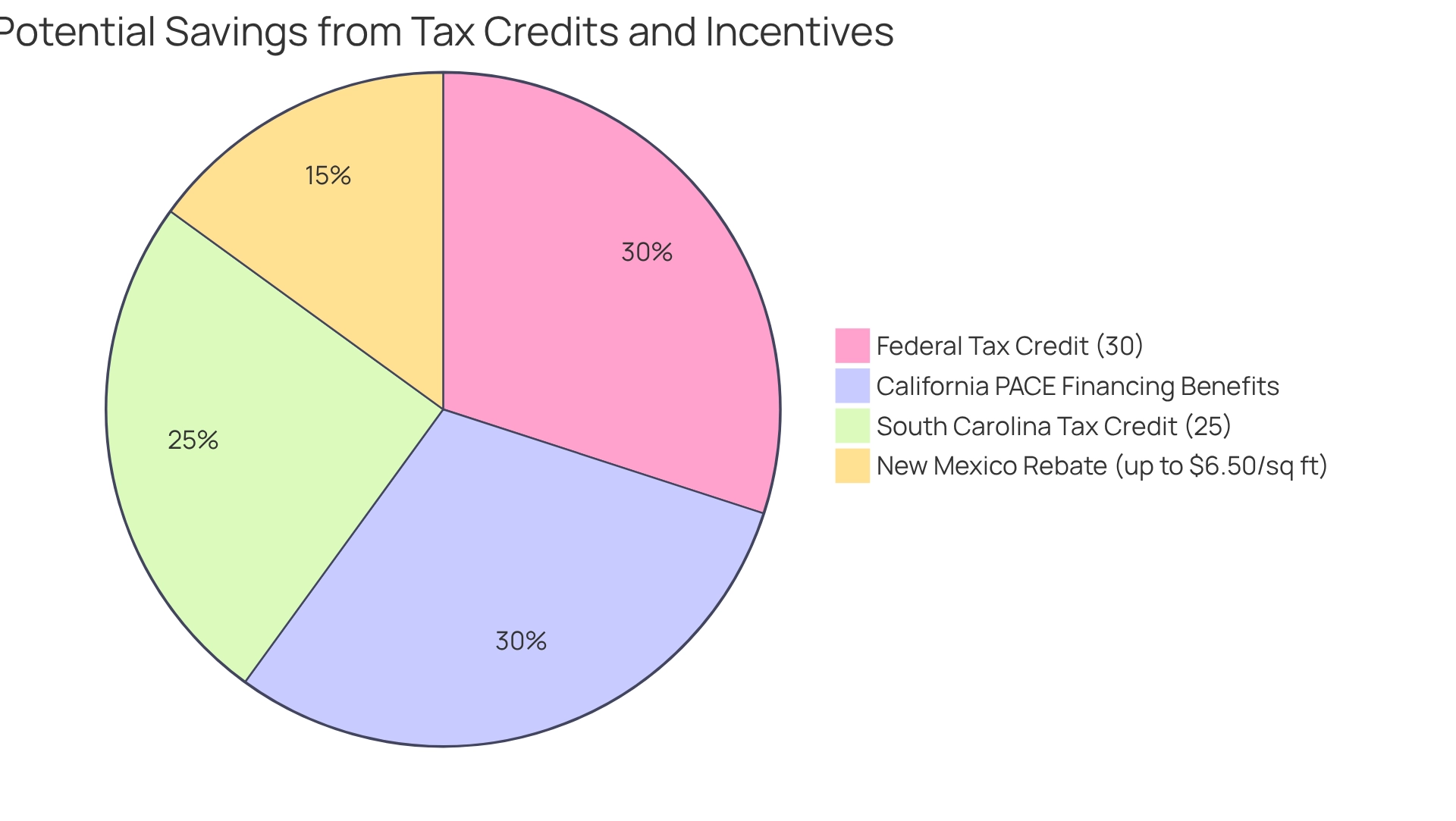
Benefit from Low Maintenance and High Reliability
Are you feeling the pinch of rising energy bills? could be the solution you’ve been searching for. These systems are not only reliable but also require minimal maintenance, making them an appealing choice for homeowners looking to embrace sustainable energy solutions. Typically, they need just periodic inspections and occasional cleaning of the collectors to operate at their best. Keeping the panels clean is essential for maintaining efficiency and enhancing power production. Over time, dust, dirt, bird droppings, and other debris can accumulate, blocking sunlight and hindering performance. When properly installed and cared for, thermal heaters can last over 20 years, consistently providing heated liquid while reducing the need for frequent repairs associated with conventional heating systems.
Routine preventive upkeep, including cleaning, is crucial to ensure optimal functionality and longevity. A case study on heating system maintenance illustrates that organizations investing in regular upkeep can optimize power generation and reduce utility expenses, reinforcing the value of heating systems. Expert Andrea Mott, a mechanical engineer, points out that operational and maintenance costs encompass both on-site staff efforts and skilled labor from contractors, underscoring the importance of effective maintenance strategies. Additionally, researchers from the Indian Institute of Engineering Science and Technology have developed a model to assess dust buildup on photovoltaic panels, which is vital for determining maintenance intervals.
In real-world scenarios, the reliability of heating systems has been demonstrated through numerous case studies, showcasing their efficiency in delivering steady hot liquid while decreasing reliance on traditional power sources. Mike Williams emphasizes that harnessing sunlight allows homeowners to manage rising energy costs and fosters positive public relations for eco-friendly initiatives, characterizing this form of renewable energy as a secure alternative to nuclear power. This combination of low upkeep and high reliability, along with the importance of keeping collectors clean, makes solar water heaters an excellent choice for those looking to adopt sustainable energy solutions.
Together, we can explore how solar energy can empower you to achieve energy independence while caring for our planet. Let’s work towards a brighter, more sustainable future for your home.
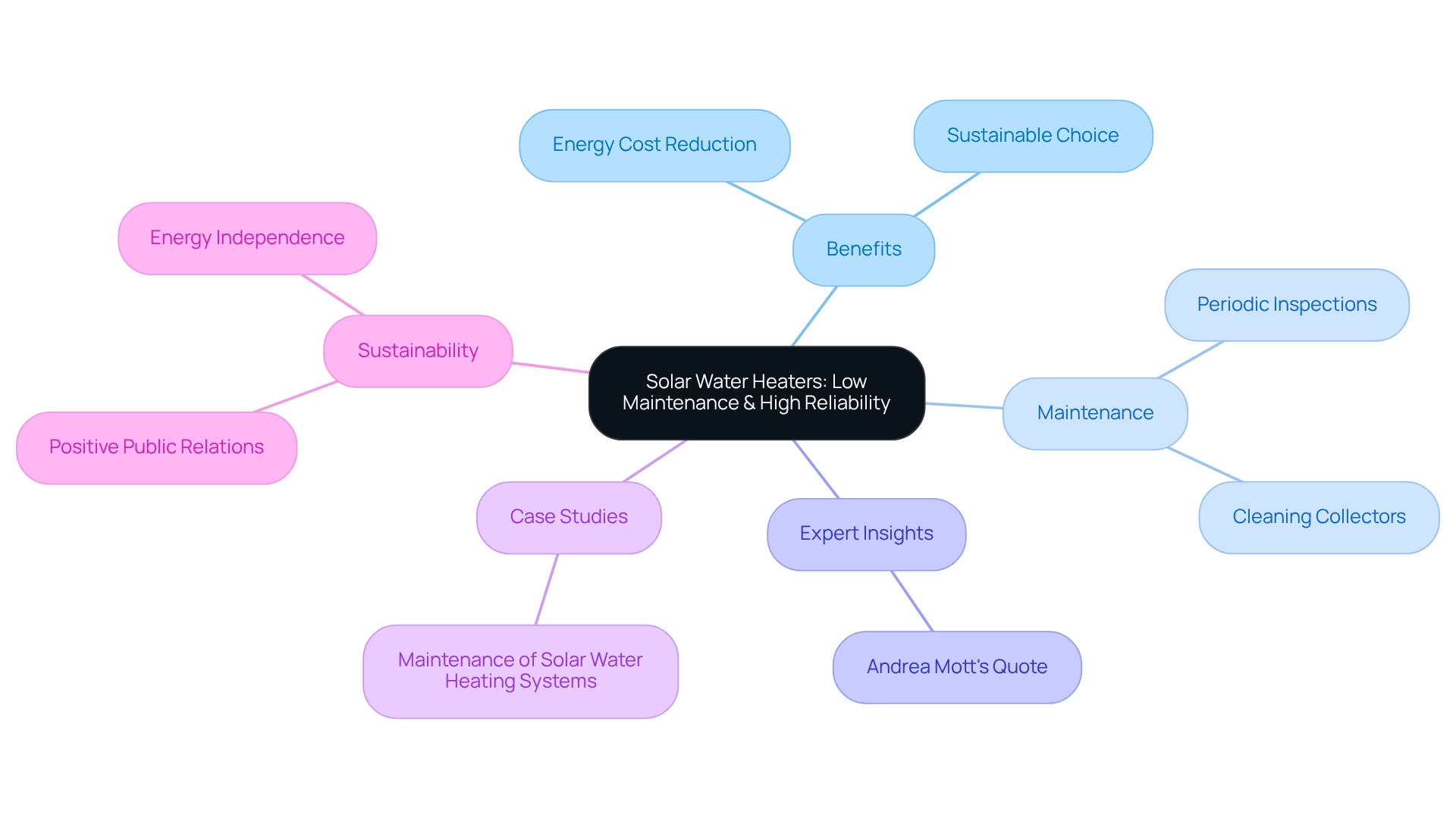
Increase Your Home’s Value with Solar Water Heating
Are you concerned about rising energy bills? Installing a thermal heater can not only alleviate those worries but also greatly enhance your home’s market value. Studies show that residences equipped with solar water heaters generally sell for higher amounts than comparable homes without these features. In fact, 63% of realtors believe that emphasizing a home’s efficiency, including solar water heaters, is beneficial in listings. This growing trend highlights the increasing importance of sustainable choices among homebuyers, who are increasingly drawn to the prospect of reduced utility costs and a smaller environmental footprint.
Significantly, case studies from Southern California reveal that households can achieve over 70% reductions in energy costs after installing solar water heaters. This not only boosts property value but also aligns with a commitment to environmentally friendly living. Moreover, homes in cooler areas have benefited from passive energy designs, showcasing the versatility of these systems. As points out, the presence of solar water heaters that harness sunlight can have a substantial impact on a home’s sale potential.
While the initial investment in heating systems may not always be fully recouped upon resale, the long-term savings on energy expenses and potential tax benefits make it a wise financial choice. Therefore, investing in thermal heating systems not only enhances your property’s appeal but also positions it favorably in a competitive real estate market.
Together, let’s explore your options for solar heating solutions. We encourage you to seek guidance from Powercore Electric for expert advice that can help you make an informed decision.
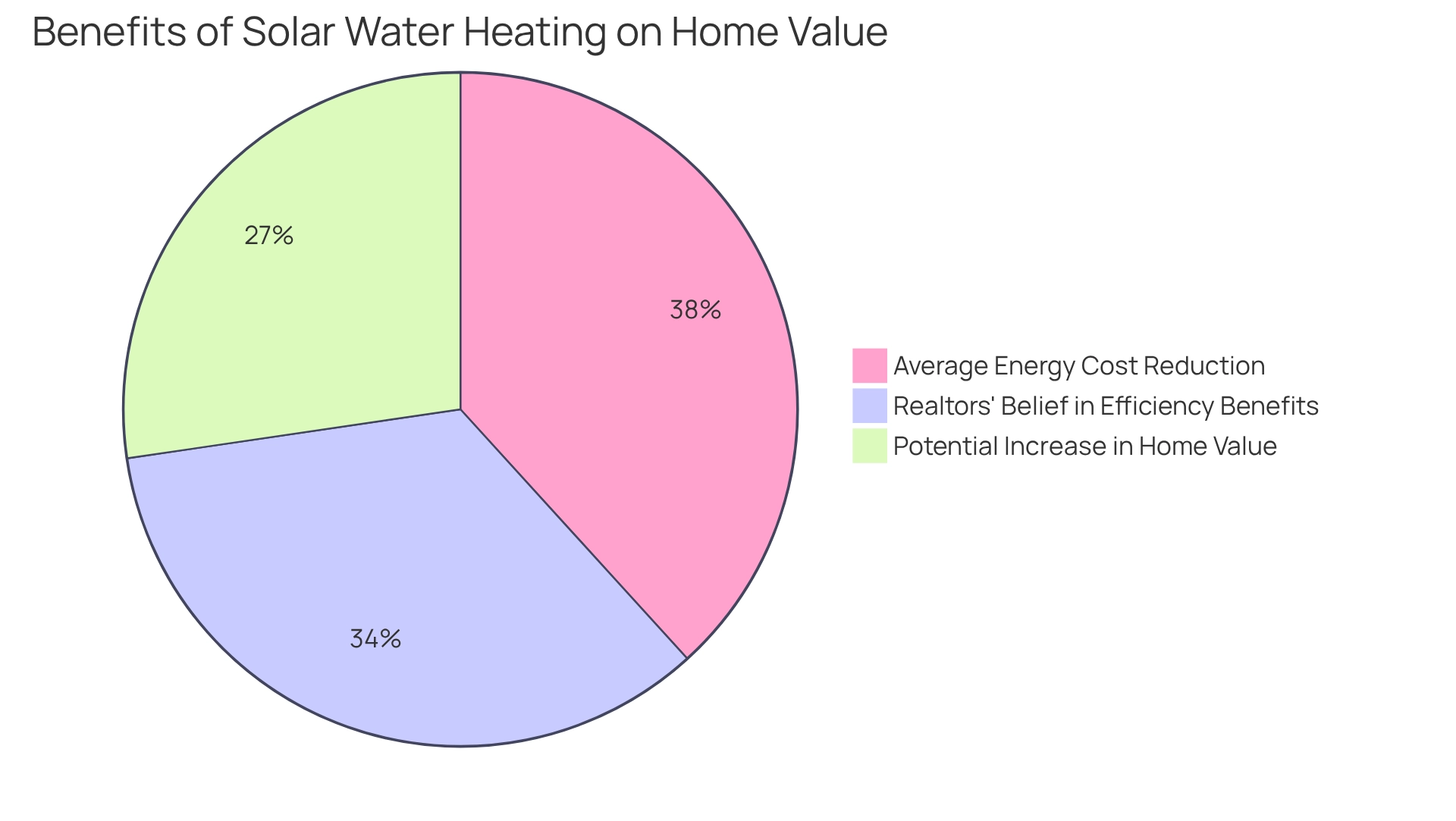
Integrate Easily with Existing Water Heating Systems
Are you feeling overwhelmed by rising energy bills? for homes offer a wonderful opportunity to ease that burden while seamlessly integrating with your current heating systems. By adjusting these setups to warm water before it enters your traditional heater, you can significantly reduce the energy required for heating. This hybrid approach not only boosts efficiency but also ensures a steady supply of hot water, making solar water heaters an ideal choice for many households seeking comfort and sustainability.
These systems have shown remarkable potential in enhancing overall resource savings, encouraging a more sustainable lifestyle. As Hamideh Sheikhani insightfully points out, ‘From both ecological and resource-conserving perspectives, heating and cooling solutions have recently demonstrated their value in the commercial sector as the eco-friendly and sustainable power alternatives.’ To ensure your system performs at its best, we understand the importance of annual professional inspections, which can uncover hidden issues before they escalate into costly failures.
Moreover, incorporating thermal heaters requires careful assessment and planning. It’s common to feel uncertain about where to start, but rest assured that thoughtful execution can lead to optimal outcomes. Additionally, understanding the role of photovoltaic panels and selecting the right batteries for efficient power storage can further enhance the benefits of your heating solutions. Together, we can align these efforts with the broader goal of achieving efficiency and sustainability in our homes. Let’s work towards a brighter, more energy-independent future, one step at a time.
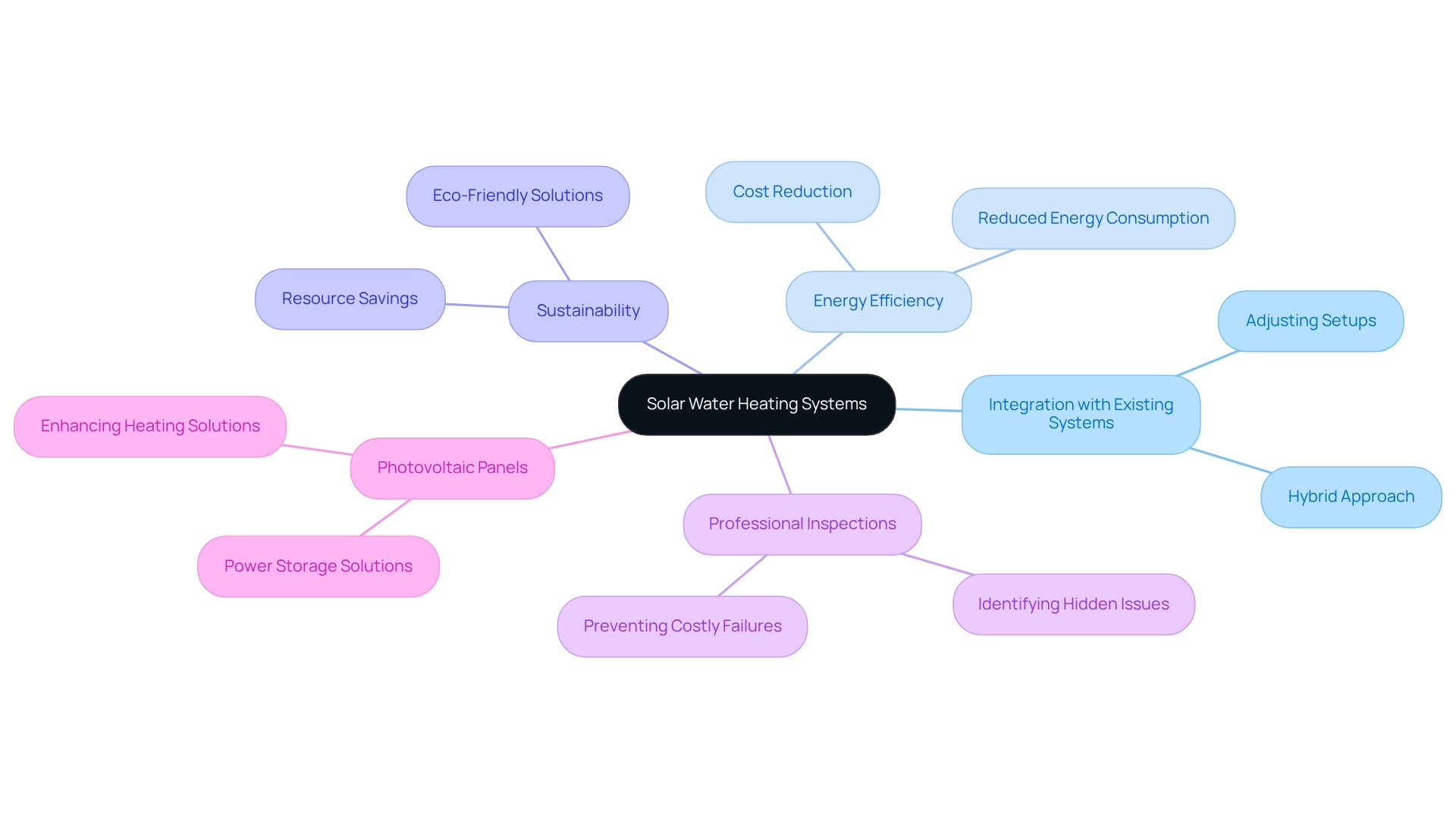
Leverage Advanced Technology for Enhanced Efficiency
Contemporary solar heating systems are truly at the forefront of technological innovation, significantly enhancing efficiency and performance. We understand that as energy costs rise, homeowners are looking for reliable solutions. The incorporation of intelligent controllers empowers these systems to capture and utilize energy more effectively, ensuring that you benefit from maximum energy output. These controllers also allow for remote monitoring and control, which not only improves operational efficiency but also contributes to environmental sustainability. As a result, you can enjoy a dependable and efficient hot heating solution that adapts to your specific needs.
Choosing the right heating solution requires thoughtful evaluation of several essential elements. Begin by considering your regional weather and the amount of sunlight your location receives, as these factors directly impact the effectiveness of your setup. Additionally, reflect on your household size and hot water requirements to determine the appropriate capacity. Budget is another crucial factor; while the initial investment may be significant, solar heating solutions provide long-term savings by reducing utility expenses and minimizing reliance on traditional energy sources. It’s also important to consider the ease of installation and maintenance, as well as the First Hour Rating (FHR), which measures the amount of hot water a heater can deliver in the first hour of operation. A system with a high FHR may be more suitable for households with higher hot water demand.
The renewable energy heater market is anticipated to grow from $4.26 billion in 2023 to around $6.18 billion by 2028, indicating a rising demand for effective energy solutions. This growth is driven by advancements in collector technology, which enhance the ability to capture sunlight efficiently. For instance, modern water heaters can harness more sunlight than their predecessors, leading to significant efficiency improvements. Importantly, photovoltaic sources represented approximately 6% of electricity production in Colombia as of April 2024, underscoring the global impact of renewable energy.
As Mike Williams aptly states, “With the cost of energy continually increasing, adopting renewable energy allows you to manage escalating energy expenses and generates positive public relations from opting for environmentally friendly practices in your operation.” This perspective highlights the financial and reputational benefits of embracing renewable energy technology, directly connecting to the economic advantages we’ve discussed.
However, it’s common to feel overwhelmed by the technology, and case studies reveal that while the technology is efficient, challenges like the availability of skilled contractors can hinder adoption, particularly in areas with limited experience in thermal installations. The case study titled “Challenges in Solar Water Heating Adoption” emphasizes this barrier, suggesting that regional expertise and contractor availability are critical for homeowners considering this option. Overall, advancements in technology not only enhance efficiency but also position as a viable solution for eco-conscious homeowners seeking to reduce utility expenses and promote sustainability. Together, we can explore these options and find the best solution for your home.
Achieve Energy Independence and Security
Setting up a thermal heater can empower homeowners to take control of their energy usage. We understand that rising utility expenses can be a significant concern, and these setups allow individuals to produce their own heated liquid, effectively reducing reliance on traditional power sources. For instance, a California household that invested in a water heating solution initially priced at $6,000 saw their costs drop to $3,800 after utilizing available incentives. This investment not only saves them about $500 each year on utility bills but also contributes to a remarkable reduction of 40,000 kWh of electricity over its lifetime, resulting in a decrease of 30 tons in CO2 emissions.
Numerous case studies further illustrate the effectiveness of solar heating technologies. One household in Southern California experienced over a 70% decrease in utility costs after installing a water heating system combined with a heat exchanger. This showcases the substantial savings and sustainability benefits that come with making such a choice. In cooler regions, passive power collection designs have also proven efficient. For example, one notable setup used large south-facing windows to capture sunlight during winter, significantly lowering costs.
Moreover, the payback period for more efficient models is just 1.5 years, making this investment even more appealing. This newfound independence not only enhances personal safety but also promotes a sustainable energy future. It aligns beautifully with the growing acknowledgment of solar solutions as a vital approach to combat global warming. Transitioning to is a forward-thinking step towards energy stability, enabling homeowners to manage their power needs while being kind to the environment.
By investing in solar water heaters, homeowners not only shield themselves from escalating utility costs but also contribute to reducing reliance on conventional energy sources. It’s important to keep in mind that installation and maintenance costs for water heating systems can vary significantly, so we encourage homeowners to consult manufacturers and contractors for accurate estimates.
At Powercore Electric, we bring over 30 years of experience in California, dedicated to helping homeowners navigate these factors and realize the benefits of renewable energy technology. As one satisfied customer shared, “Ryan and his team were great. They were quick, effective, and adhered to the timeline for our energy system installation.” This commitment to exceptional service ensures unmatched quality craftsmanship and a customer-first approach. Together, we can create a more sustainable future.
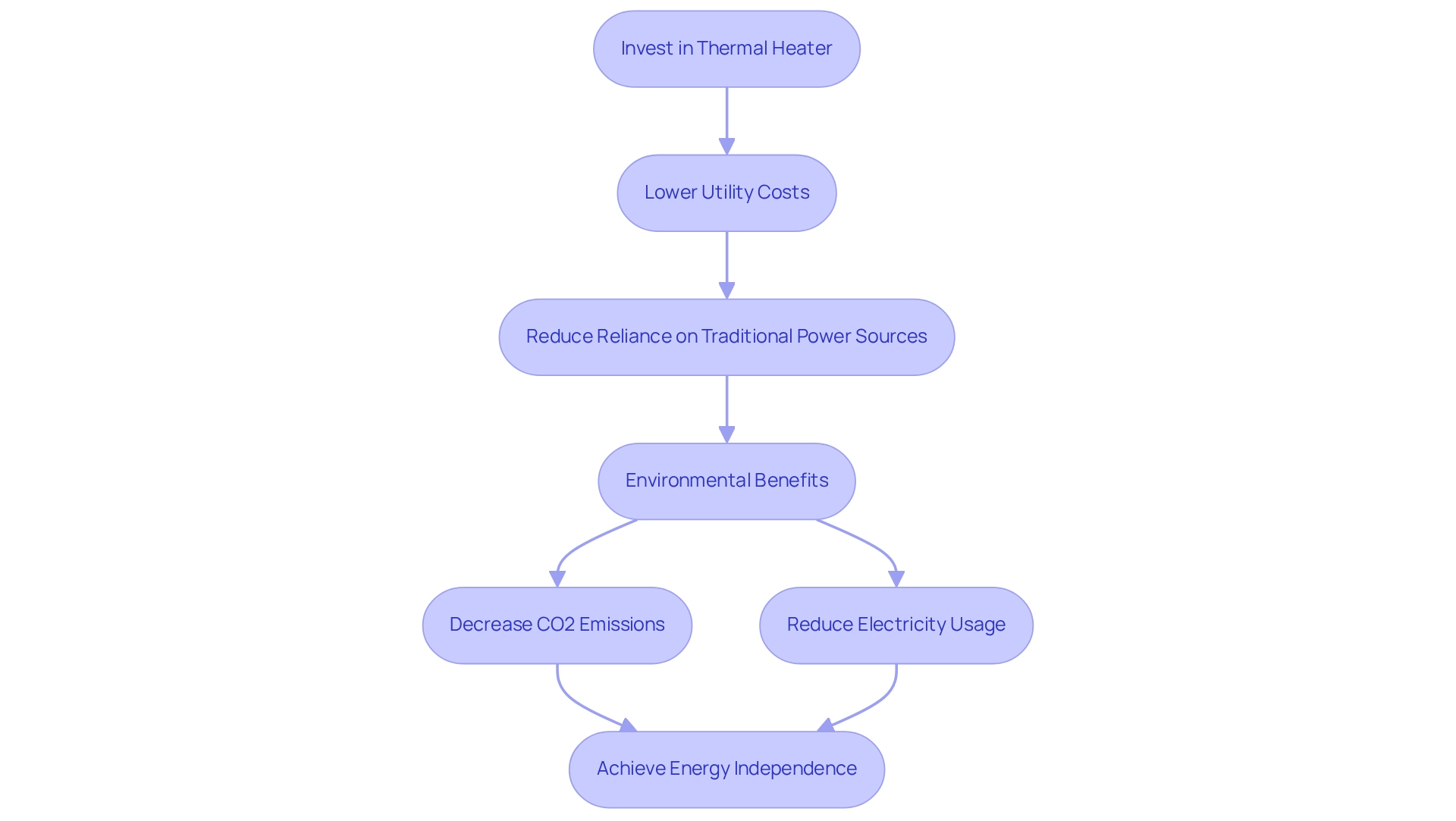
Join the Growing Trend of Solar Energy Adoption
We understand that rising energy bills can be a source of concern for many homeowners. The adoption of sunlight power is gaining momentum, as more individuals embrace renewable energy solutions that not only alleviate these worries but also connect them with a community committed to sustainability. Investing in solar water heaters for your home enhances your energy efficiency and supports broader environmental goals. This shift allows you to benefit from ongoing advancements in renewable energy technology.
In California, is flourishing, driven by supportive policies and increasing utility costs, creating a perfect opportunity for homeowners to transition to renewable solutions. As Paul Chiao, Sales and Marketing Director, insightfully notes, “As policy, innovation, and market demand converge, renewable resources will continue to be a driving force in the transition toward a cleaner, more sustainable power future.”
While the Texas residential photovoltaic market faces challenges with a -29% year-over-year drop, California’s market showcases the resilience and potential of renewable resources. As communities increasingly adopt sunlight-based heating systems, the collective impact on reducing carbon footprints is becoming evident, underscoring the vital role of renewable energy in achieving a cleaner, more sustainable future.
By choosing Powercore Electric for your solar water heater installation, you are not only investing in your property but also supporting community initiatives aimed at promoting renewable resources and lowering overall utility costs. Are you ready to embrace renewable energy? Contact Powercore Electric today to discover can transform your life, guiding you towards energy independence, financial savings, and a brighter, more sustainable future. Together, we can make a difference.
Conclusion
We understand that many homeowners are concerned about rising energy bills and are seeking ways to alleviate these costs. Investing in solar water heaters presents a compelling opportunity to not only reduce energy expenses but also enhance sustainability. By harnessing the sun’s energy, these systems can cut water heating bills by 50% to 80%, translating into significant savings over time. Moreover, the financial benefits are further amplified by government incentives, such as the federal tax credit, which can substantially lower initial installation costs, making solar water heating an accessible option for many.
Transitioning to solar water heaters also contributes to a cleaner environment by significantly reducing carbon footprints and greenhouse gas emissions. As homeowners embrace these renewable energy solutions, they not only secure their energy independence but also join a growing movement committed to sustainability. It’s common to feel overwhelmed by the options available, but the reliability and low maintenance requirements of these systems further solidify their appeal, ensuring long-term performance and efficiency.
Ultimately, solar water heaters represent more than just a cost-saving measure; they are an investment in a sustainable future. By integrating advanced technology and taking advantage of available incentives, homeowners can enhance their property’s value while actively participating in the shift towards renewable energy. Together, we can embrace solar water heating as a proactive step towards energy security, economic savings, and environmental stewardship. Now is the ideal time to explore the benefits of solar energy and take action towards a brighter, more sustainable future.


